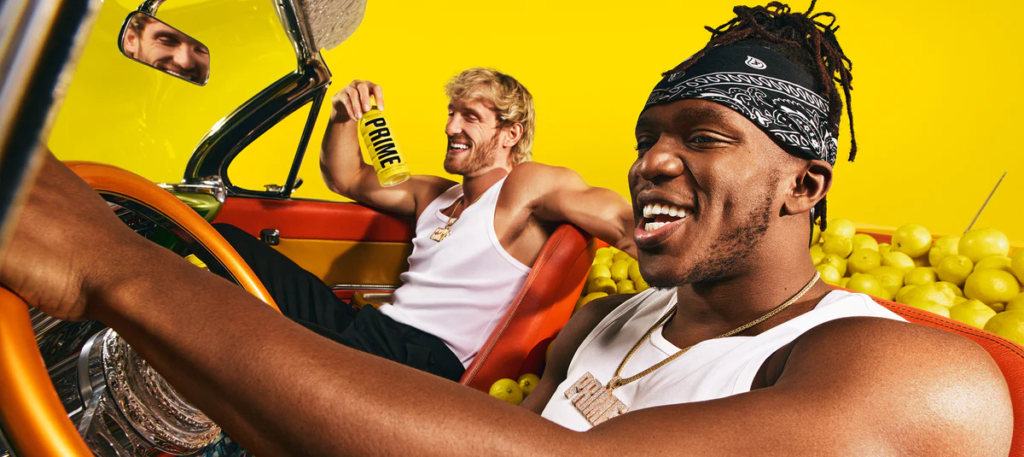
Prime energy drink is the newest addition to the sports drink market. Gatorade, for decades, has held dominion over the sports drink industry, meeting the hydration needs of athletes around the world. But recently, a surprising duo has stirred up the market, challenging Gatorade’s reign. In just a year, YouTube celebrities Logan Paul and KSI launched their brand, Prime, quickly creating a significant impact.

Prime Energy Drink: An Unexpected Takeover
Although KSI and Logan Paul are the faces of Prime, the real brains behind the brand are Trey Steger and Max Clemens, owners of Congo Brands. The company specializes in developing influencer-based brands, identifying profitable niches within burgeoning markets. The partnership of these two YouTube personalities was carefully orchestrated to leverage their combined audience of 39 million followers, with a fan base spanning the United States and the United Kingdom.
Prime Energy Drink’s clever marketing strategy went beyond just the star power of KSI and Logan Paul. The brand leveraged the concept of scarcity, driving up demand by making the product hard to get. As humans, we often ascribe more value to scarce products, which helps explain why mobs of people were reportedly going to great lengths to buy the drink, and why it continues to sell out quickly online.
Social Marketing: Is Prime An Energy Drink?
Prime Energy Drink’s marketing pitch centers on its lower sugar content and double the electrolyte content compared to Gatorade. However, a closer look reveals some questionable claims. While Prime has less sugar, it replaces this with sucralose, which carries its own health concerns. More critically, Prime lacks substantial amounts of sodium, an electrolyte that is essential in a sports drink for replacing what athletes lose in sweat. Instead, Prime contains higher levels of potassium to boast of its ‘double electrolyte’ claim, without affecting the taste.
The success of Prime Energy Drink not only challenges Gatorade’s position but also raises concerns for the overall sports drink industry. Prime has redefined what it means to be a sports drink, omitting critical ingredients like sodium. This misleading representation can force other brands to modify their formulas to compete on taste, possibly leading to a diluted meaning of ‘sports drink’.
The successful strategy employed by Prime might encourage other companies to leverage influencer partnerships or manipulate their product ingredients to appeal to a broader audience. This could potentially steer the industry away from the core purpose of sports drinks – to aid athletes with proper hydration.
In conclusion, Prime’s rise in the sports drink industry demonstrates the power of influencer marketing and clever branding strategies. However, it’s critical for consumers to look beyond the hype and carefully assess the nutritional claims of such products. While Prime might have reshaped the sports drink industry, only time will tell how other brands will respond and how this will impact the market’s landscape.
At the end of the day, it’s essential for companies to remember their core purpose and maintain their integrity, instead of solely focusing on the race for market dominance. A good example of a grassroots business bred through passion and integrity is Johnny Cupcakes, which you can read more about from our feature article.
Is Prime an Energy Drink Key Takeaways
- The Shift in the Sports Drink Industry: Logan Paul and KSI, YouTube personalities, have disrupted the sports drink industry, previously dominated by Gatorade, with the launch of their brand, Prime. Despite their unconventional background, they have been successful due to the increasing demand for functional drinks that cater to a wider audience, beyond professional athletes.
- The Role of Influencer Marketing: The success of Prime can be attributed to the innovative marketing strategies of Congo Brands, who capitalized on Logan and KSI’s popularity and online rivalry to generate hype around the product. The strategy exploited the personal connection that YouTubers often have with their audience, positioning the product as an extension of the YouTubers’ personal brand.
- Controversy Over Health Claims and Scarcity Marketing: Prime makes bold health claims, like having lower sugar content and twice the electrolytes of Gatorade. However, the article suggests these claims are misleading and that Prime might be artificially creating product scarcity to generate hype and increase demand.
- Potential Implications for the Future: Prime’s success indicates a shift in the sports drink industry, potentially leading to a trend where other influencers could launch personal brands or companies may alter ingredients to compete. There’s concern that such practices could undermine the true purpose of sports drinks, and companies may need to choose between ethical practices and chasing profits.
